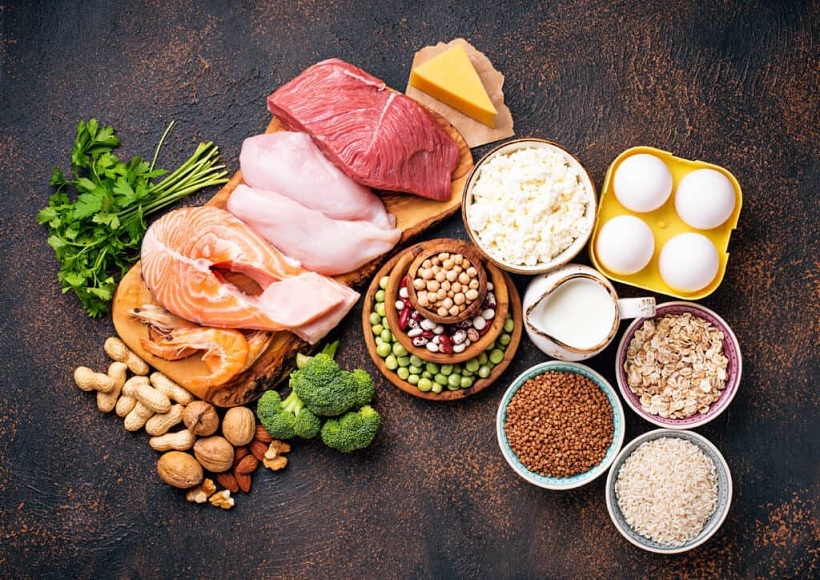Protein is one of the most important nutrients our body needs. It helps build muscles, repair tissues, and keeps us full and energized. Whether you’re trying to stay healthy, lose weight, or gain muscle, protein foods are a key part of your diet.
In this article, we’ll explore what protein is, the best sources of protein, how much protein you need, and tips for adding more protein to your meals.
Table of Contents
What Is Protein and Why Do We Need It?
Protein is a nutrient made up of building blocks called amino acids. Our body needs protein for many reasons:
- To build muscles and tissues
- To make hormones and enzymes
- To repair cells and body parts
- To support growth, especially in children and teens
How Protein Works in the Body
Every part of our body — including our skin, hair, and nails — needs protein. When we eat protein foods, our body breaks them down into amino acids. These amino acids are then used to build new proteins inside us.
Types of Protein Foods
There are many foods rich in protein. They can be divided into two main types:
Animal-Based Protein Foods
These foods come from animals and usually have complete protein, which means they contain all the essential amino acids our body needs.
Examples of animal protein foods:
- Eggs
- Chicken
- Turkey
- Fish (like salmon, tuna, and sardines)
- Beef and pork
- Milk, cheese, and yogurt
Animal proteins are great for muscle growth and repair. But it’s good to choose lean meats and low-fat dairy to avoid extra fat and calories.
Plant-Based Protein Foods
These are foods from plants that are high in protein. Some may not have all the essential amino acids, but you can still get enough by eating a variety of them.
Examples of plant protein foods:
- Beans and lentils
- Chickpeas
- Tofu and tempeh
- Nuts and seeds (like almonds, chia seeds, and sunflower seeds)
- Whole grains (like quinoa, brown rice, and oats)
- Green peas and spinach
Plant proteins are also high in fiber and low in fat, making them a healthy choice for everyone.
How Much Protein Do You Need?
The amount of protein a person needs depends on their age, weight, activity level, and health goals.
General daily protein recommendations:
- Children (4–8 years): Around 19 grams
- Teens (14–18 years): Around 46 grams for girls, 52 grams for boys
- Adults (19+ years): Around 46 grams for women, 56 grams for men
- Active people or athletes: 1.2 to 2 grams of protein per kilogram of body weight
If you’re trying to build muscle, you may need more protein. Always check with a doctor or dietitian to find what’s right for you.
Top High-Protein Foods to Include in Your Diet
Here are some of the best and easiest protein foods you can add to your daily meals:
Eggs
- One of the best sources of protein.
- One egg has about 6 grams of protein.
- Easy to cook — scrambled, boiled, or in an omelet.
Chicken Breast
- A lean source of protein.
- 100 grams of cooked chicken breast has about 30 grams of protein.
- Can be grilled, baked, or added to salads.
Greek Yogurt
- Thicker and creamier than regular yogurt.
- 1 cup can have up to 20 grams of protein.
- Great for breakfast or snacks.
Lentils
- A plant-based powerhouse.
- 1 cup of cooked lentils has about 18 grams of protein.
- Good for soups, stews, and curries.
Tofu
- Made from soybeans.
- 100 grams of tofu has about 10 grams of protein.
- Can be stir-fried, grilled, or added to soups.
Cottage Cheese
- High in protein and low in fat.
- 1 cup of low-fat cottage cheese has about 28 grams of protein.
- Eat it with fruits or vegetables.
Quinoa
- A grain that is also a complete protein.
- 1 cup of cooked quinoa has about 8 grams of protein.
- Works well in salads or as a side dish.
Benefits of Eating Protein Foods

Adding more protein to your diet can bring many health benefits:
Helps Build and Maintain Muscles
Protein is the building block of muscle. Whether you’re working out or aging, getting enough protein helps keep your muscles strong.
Keeps You Full Longer
Protein helps you feel full and satisfied, which can stop you from overeating or snacking too often.
Supports Weight Loss
Because protein keeps you full and boosts your metabolism, it’s helpful when trying to lose weight.
Good for Bone Health
Protein works with calcium and vitamin D to keep your bones strong, especially as you get older.
Helps Repair the Body
Protein supports healing after injuries or surgeries and helps fight sickness by boosting your immune system.
Simple Ways to Add More Protein to Your Meals
You don’t have to make big changes to eat more protein. Here are some easy tips:
At Breakfast:
- Add eggs to your morning meal.
- Choose Greek yogurt instead of regular yogurt.
- Spread peanut butter on toast.
At Lunch:
- Include grilled chicken or tuna in your salad.
- Add beans or chickpeas to your soup.
- Choose whole-grain bread with lean meat or cheese.
At Dinner:
- Serve lentils, tofu, or fish with rice or vegetables.
- Try a quinoa bowl with mixed veggies and beans.
- Cook lean meat with a side of steamed greens.
For Snacks:
- Keep hard-boiled eggs or cheese sticks in the fridge.
- Snack on almonds or sunflower seeds.
- Enjoy protein shakes or smoothies with fruits.
What About Protein Supplements?
Protein powders and shakes can help if you struggle to meet your protein needs from food alone — especially for athletes or busy people.
Common types of protein supplements:
- Whey protein: Fast-digesting and good for muscle building.
- Casein protein: Slow-digesting and good for nighttime use.
- Plant-based protein: Made from peas, rice, or hemp — good for vegans.
But remember, real food is always the best source. Use supplements only if needed and after talking to a health expert.
Are There Risks of Eating Too Much Protein?
While protein is very important, eating too much over time may cause:
- Kidney strain in people with kidney issues
- Dehydration if not drinking enough water
- Weight gain if protein foods are high in fat or calories
It’s best to eat a balanced diet with the right amount of protein, carbs, and fats.
Final Thoughts: Make Protein a Part of Every Meal
Protein foods are vital for a healthy body and mind. Whether you’re a meat lover or a vegetarian, there are plenty of tasty and healthy ways to include protein in your diet. By choosing a mix of animal and plant-based proteins, you’ll give your body the fuel it needs to stay strong, active, and energized.
Quick Summary: Protein Foods at a Glance
| Food | Protein per 100g | Type |
|---|---|---|
| Eggs | 6g per egg | Animal |
| Chicken breast | 30g | Animal |
| Lentils (cooked) | 9g | Plant |
| Tofu | 10g | Plant |
| Greek yogurt | 10–20g per cup | Animal |
| Quinoa (cooked) | 8g | Plant |
| Almonds | 21g | Plant |
| Tuna | 29g | Animal |










